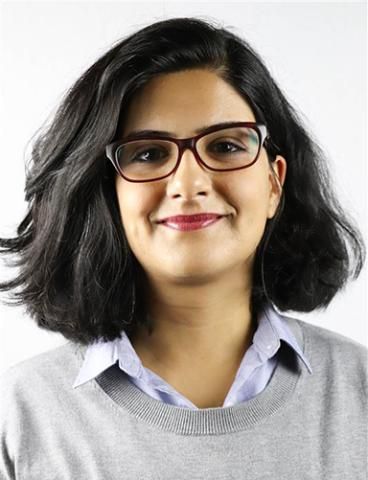Graduate Mentorship Award Recipients
The Graduate Mentorship Award recognizes faculty members who demonstrate excellence in graduate-level mentorship and who foster intellectual, professional, and personal development of graduate students at the University of Lethbridge. Outstanding mentors inspire and motivate students under their supervision to be creative thinkers, to push their research, scholarly, and creative activities in new directions, and to make a positive impact on the community and the future as global citizens.
Graduate Mentorship Award 2023 Recipient Dr. Gülden Özcan

The inaugural University of Lethbridge Graduate Mentorship Award was granted posthumously to Dr. Gülden Özcan who, during her too-brief four years as a Faculty Member at the University of Lethbridge, amply demonstrated the qualities this award seeks to recognize.
Students with the good fortune of having Dr. Gülden Özcan as an instructor learned very quickly how devoted she was to ensuring their academic success. An unwavering leader who inspired and motivated learners to be creative thinkers and global citizens, Özcan was especially impactful as a mentor to graduate students.
Originally from Turkey, Özcan completed a BA at Baskent University in Ankara and an MA and PhD at Carleton University. She joined the University of Lethbridge in 2018 as an assistant professor in the Department of Sociology. During her short time as a faculty member, Özcan distinguished herself through her work, including involvement in radical theatre, with the Scholars at Risk program and in critical police studies. She also worked at challenging and disrupting systemic and social injustice issues on campus and was the first ever recipient of the SNAC+ (Support Network for Academics of Colour Plus) Excellence in Equity Award.
Her greatest strength was engaging the minds of her students, and should any express an interest in graduate studies, she was quick to take an interest in nurturing that desire. Özcan was known for acting as a supervisor to students before they had even gained admittance to the graduate program, so committed was she to supporting their interests. Whether she eventually agreed to supervise a student or help find them a supervisor more aligned with their specific interests, she was a supportive presence in the important initial stages of their graduate school journey.
As a mentor and supervisor, she encouraged her students to take ownership of their graduate education. Graduate students, she believed, should not only think about what they want to get from their programs but should be heard when they express their vision for their graduate education. Accordingly, Özcan taught students to advocate for themselves and to believe in their ideas.
Özcan's dedication to her craft, and especially her students, was no more apparent then when she became ill. Her first concern was for her students' ongoing supervision, and beyond helping students find new supervisors, she continued to be a positive, committed and supportive presence in their programs as long as she was able.
Graduate Mentorship Award 2024 Recipient Dr. Kristine Alexander

Inspired by the mentors who supported her along the way, Dr. Kristine Alexander is paying it forward by supporting her own graduate students on their academic and professional journeys.
Alexander is an Associate Professor in the University of Lethbridge’s Department of History. From 2013-2023 she held the Canada Research Chair in Child
and Youth Studies and was co-director of the University’s interdisciplinary Institute for Child and Youth Studies. She has supervised numerous graduate students in history and cultural, social and political thought (CSPT), served on supervisory committees in anthropology, CSPT, history and sociology, and (with Dr. Jan Newberry) recruited and supervised the first postdoctoral fellow in the humanities at ULethbridge.
Alexander encourages her graduate trainees to produce high-quality original research, to challenge and believe in themselves, and to connect their studies to their lives and aspirations beyond the university. Her students praise her unique ability to recognize and nurture their potential, and her approach combines intellectual rigour with encouragement, collaboration and support.
Over the past decade, Alexander’s graduate students have studied topics ranging from the Black Death in medieval Italy to the history of the American Hotel in Fort Macleod. Their research projects are historical as well as interdisciplinary, and Alexander encourages her trainees to share their findings with both academic and popular audiences. In addition to giving public talks, speaking to the media, and presenting at conferences across North America and Europe, Alexander’s students have curated exhibits at the Galt Museum and produced historical board games about the First World War and the Great Depression based on original archival research. Alexander involves her graduate students in community-engaged research projects, collaborates with them on publications, and supports them in their applications for scholarships and highly competitive national grants.
Trust, respect and community-building are cornerstones of Alexander's mentorship style. While motivating each of them individually, she also fosters genuine and long-lasting connections between her graduate students. Alexander intentionally creates a lively and supportive intellectual community within which her students can share ideas, strategize together and celebrate each other's successes.
Described by her students as insightful, patient, enthusiastic, supportive, kind, generous and empathetic, Alexander’s influence extends far beyond graduation. With her guidance, graduate trainees develop competencies and confidence that serve them well as they transition into professional careers. Her students note that she inspires them “to be kind, to be curious, and to work harder.”
